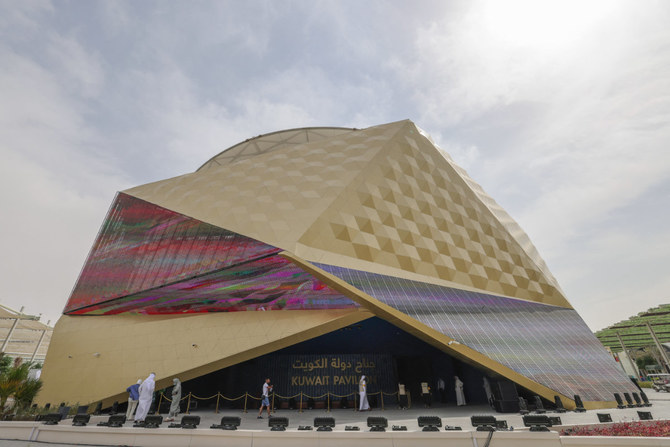DUBAI: Since their inception in the mid-19th century, World Expos have provided countries of all sizes and degrees of wealth with a rare opportunity to curate their own national narrative, and tailor their preferred image — past, present and future — before a global audience.
Specific elements of a nation’s heritage, culture and economy are distilled, refined and placed on display in often exquisite and sprawling pavilions designed to reflect the country’s distinct national character and qualities. It is by communicating in this way, through their pavilions, that participating nations define themselves on the world stage.
Taken as a whole, a World Expo can therefore perhaps best be described as a rose-tinted mirror of civilization at a specific point in time. This “greatest show” is an amalgamation of nations in their idealized state; the world depicted as it would like to be seen, and everyone is invited.
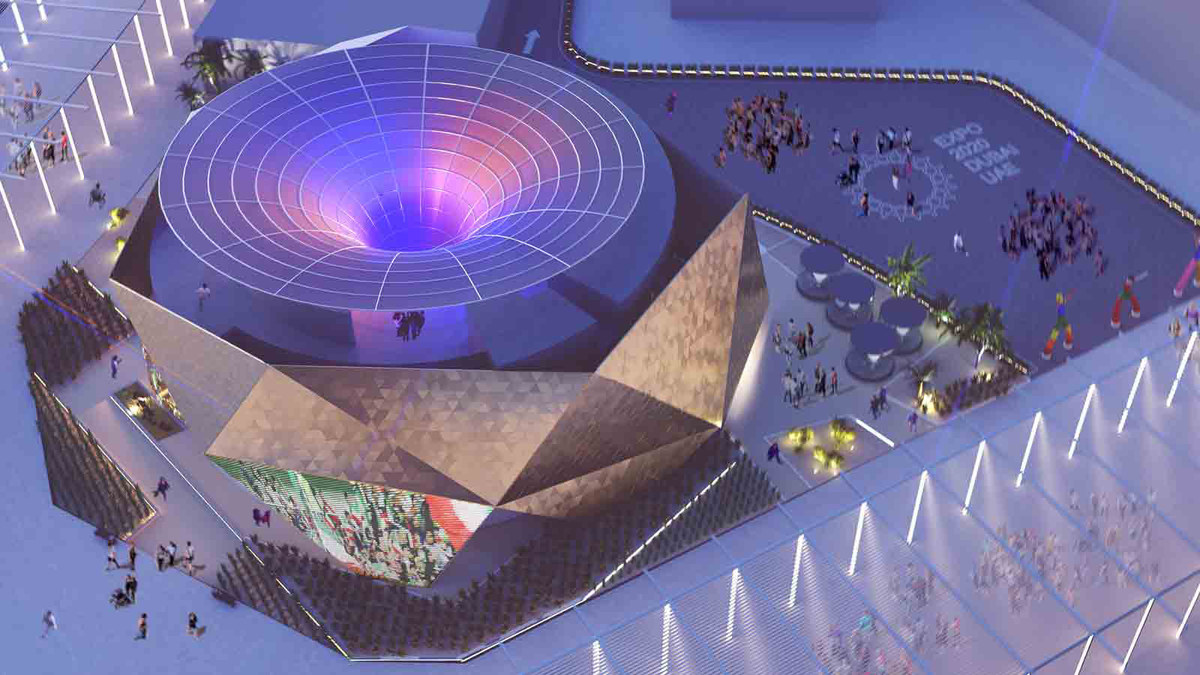
Kuwait’s progress as a post-oil nation is reflected in its presence at the World Expo. (Supplied)
Kuwait has risen, with flair and ambition, to the occasion of the first World Expo to be held in the Arab world. It is clear from the grand scale of the small Gulf kingdom’s presence at Expo 2020 Dubai that a great deal of thought and attention went into its pavilion design, content and messaging.
Kuwait City has a history of telling its preferred story through its architecture. It has undergone a number of significant transformations since the advent of oil urbanization, often through ambitious, state-led development initiatives that have consistently sought to replace the old with the new.
After 1950, almost all pre-oil structures in Kuwait City’s historic urban center were transformed to make way for a new, modern metropolis. And since 2003, a renewed cycle of development has replaced that modernist landscape with something newer still. Kuwait’s ambition at Expo 2020 is in keeping with its past, present and future.

The funnel at the Kuwait pavilion at the Expo 2020 in Dubai is a nod to its history of urban development. (AFP)
Designed by Italian architect Marco Pestalozza, the 5,600-square-meter Kuwaiti pavilion sits gracefully on a large central plot near Al-Wasl in the Sustainability District, distinguished by its irregular, roughly circular shape and gold exterior panels featuring geometric designs.
The architecture of the pavilion is a nod to Kuwait’s history of urban development. A funnel, modeled after the iconic towers built soon after Kuwait gained independence in 1961 to store desalinated water, occupies the center of the pavilion, extending from the roof to ground level.
During the day, the pavilion resembles a nugget of unprocessed gold, textured so as to echo Kuwait’s undulating desert terrain, complete with screens displaying the familiar image of camels loping across sand dunes.
At night, the pavilion is transformed. Gold no longer dominates; instead, a blue spotlight illuminates “the envelope” — the name for the wide, sloping funnel at the top of the pavilion.
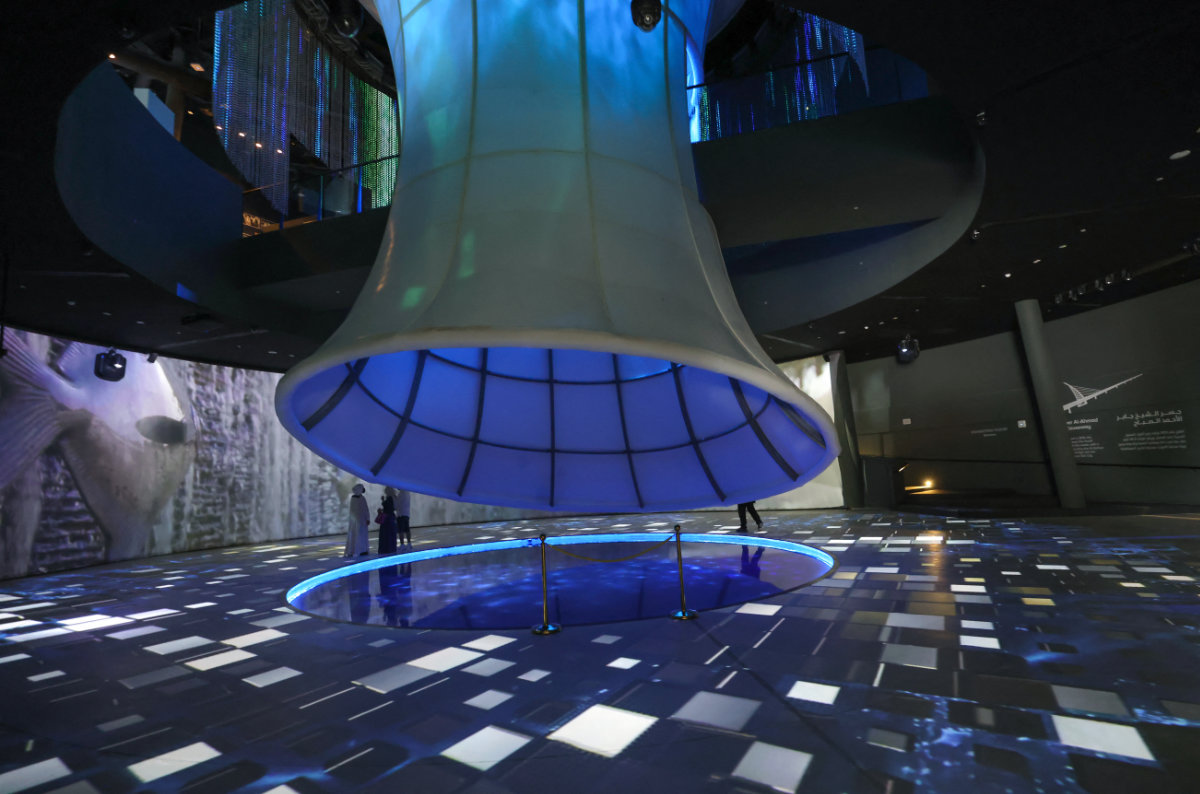
The funnel at the Kuwait pavilion at the Expo 2020 in Dubai is a nod to its history of urban development. (AFP)
The marked aesthetic transition of the building from day to night is an example of the simple yet effective ways in which the pavilion conveys its central themes of connectivity, sustainability and a diversification away from oil.
Oil was discovered in commercial quantities in Kuwait in 1938 and the industry was launched in 1946. In 1950, Kuwait’s ruler announced plans to use the country’s new, and exponentially increasing, oil wealth to make Kuwait City “the best planned and most socially progressive city in the Middle East,” unveiling a state-led modernization project hinging on the twin pillars of urban development and social welfare.
Upon entering the pavilion, visitors are greeted by a large, curved screen on which a film that explores Kuwaiti heritage, reveals the kingdom’s present and offers a glimpse into its future plays on a loop. The story is told from the perspective of an eight-year-old girl, which illustrates Kuwait’s emphasis on promoting the role of future generations of women as part of its commitment to social progress.
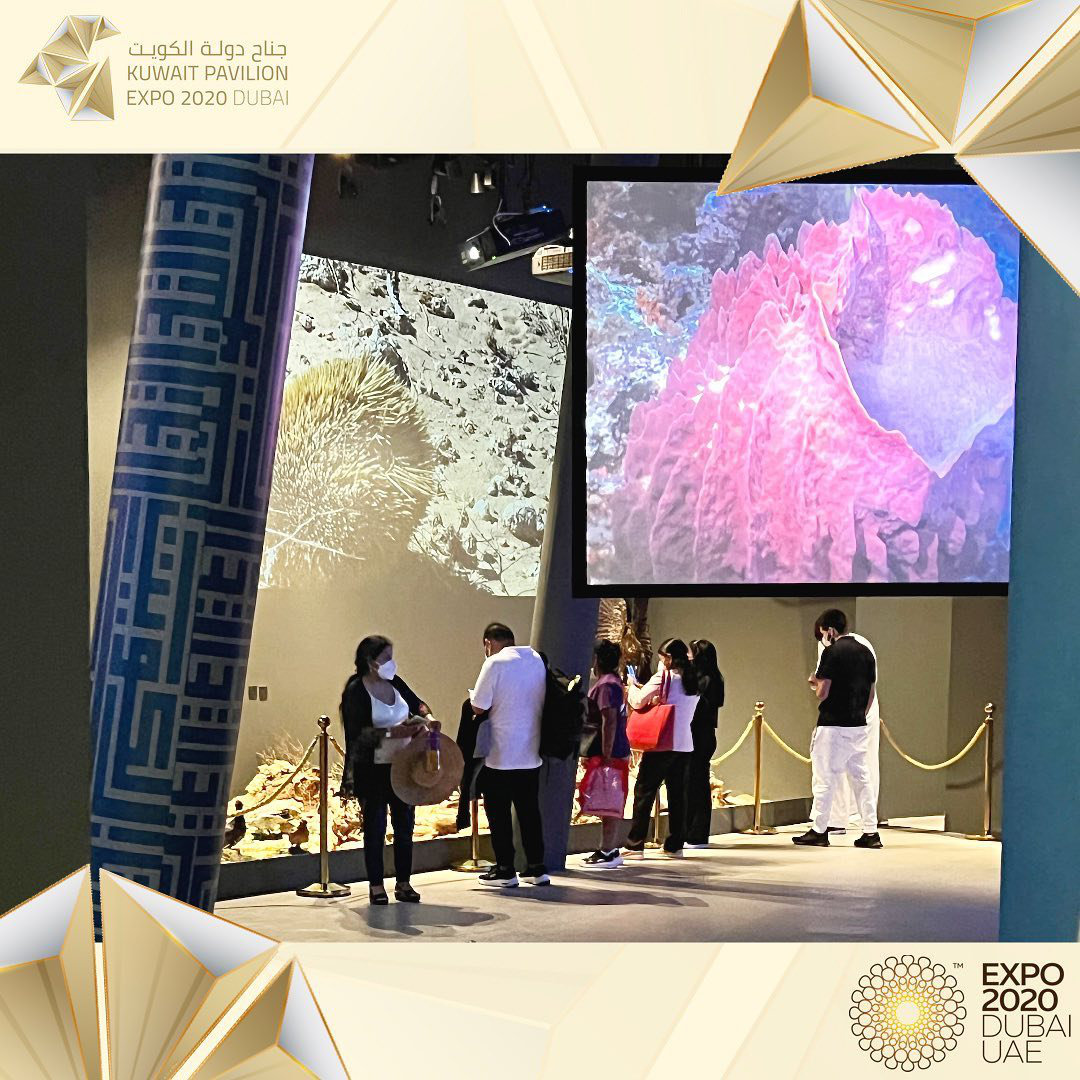
Visitors to the pavilion explore Kuwait’s cultural heritage and rich legacy. (Supplied)
From the ground floor, visitors ascend a curved staircase and are greeted by another video, this time offering a breathtaking vista of present-day Kuwait City, as viewed from the Sheikh Jaber Al-Ahmad Al-Sabah Causeway. In this film, Kuwait’s rich sea-life also features prominently, including shots of dolphins playing in the surf.
From the present, the story told by the pavilion shifts to the country’s past. Visitors are shepherded through a series of exhibits exploring Kuwait’s cultural heritage and rich legacy, reaching back about 7,000 years. Painstakingly recreated artifacts from Failaka Island, the name of which is thought to be derived from the ancient Greek word for “outpost,” are a particular highlight.
These images contrast with the story of Kuwait as a post-oil, progressive nation, outlining the substantial changes that the country has undergone. From port town to oil power, fledgling Arab democracy and a vibrant cultural society, to the Iraqi invasion and Kuwait’s economic crash, there is no question that the national story is as varied as it is rich.
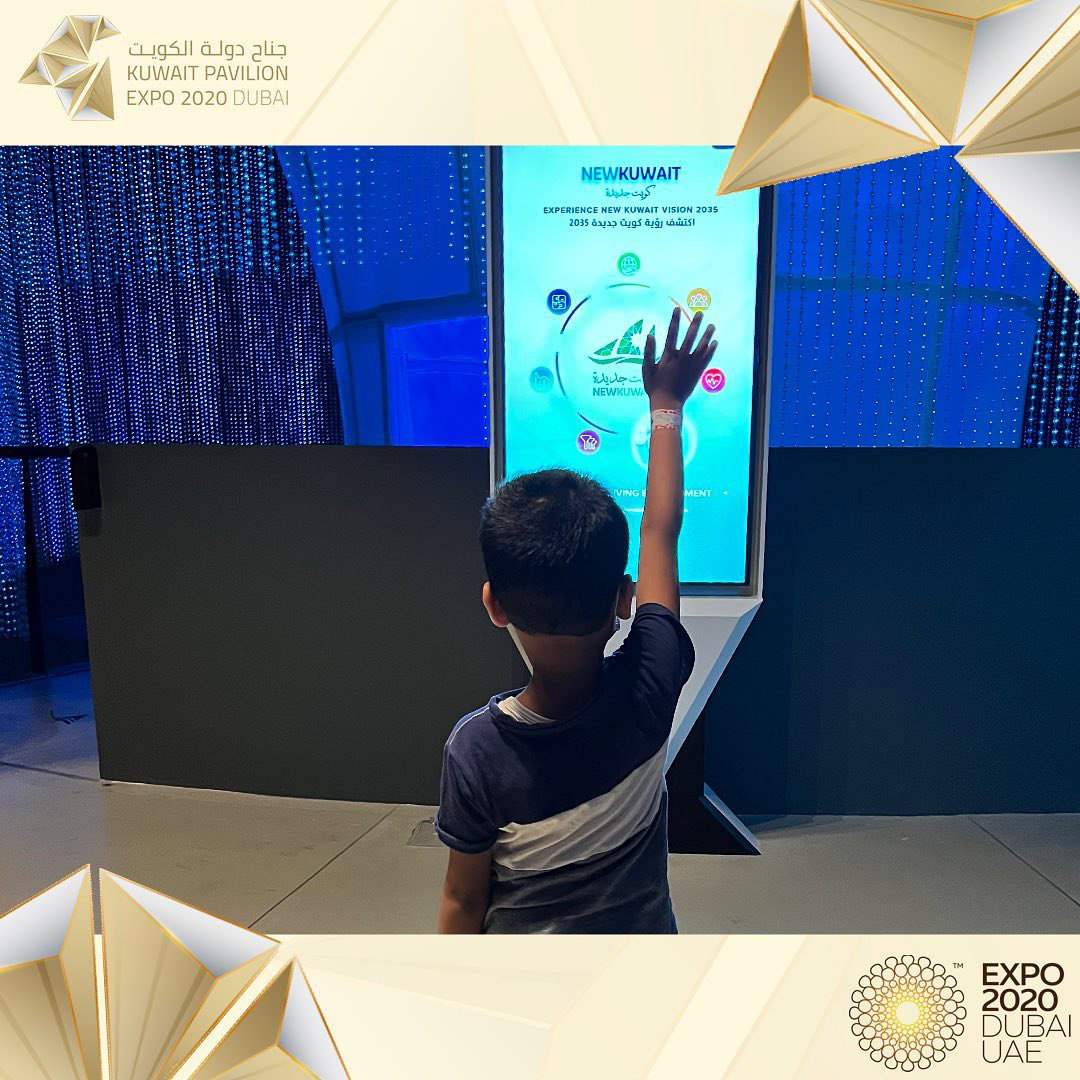
Kuwait’s progress as a post-oil nation is reflected in its presence at the World Expo. (Supplied)
Besides Qatar, Kuwait is the only Gulf Cooperation Council country whose pavilion is situated in the expo’s Sustainability District — an unusual choice, perhaps, given the ostensible contradiction between its economic mainstay, the oil industry, and the necessity of moving on to other, more sustainable sources of energy.
However, Kuwait’s pavilion designers freely acknowledge this seeming dichotomy by underscoring the kingdom’s genuine desire to diversify away from oil. Perhaps more than most, this pavilion offers a snapshot of a nation ready and willing to embrace change in the present as well as the future.
Indeed, the future features prominently in the pavilion’s exhibits. To avoid overuse of touchscreens during the pandemic, the designers elected instead to use motion-detection technology to allow visitors to explore Kuwait’s Vision 2035 without any physical contact with the equipment used.
The seven pillars of Vision 2035 are designed to solidify Kuwait’s leadership in the region, from the diversification of its economy and development of infrastructure and healthcare, to a focus on the nation’s human capital and global positioning. Sustainability is woven into each of these pillars, just as it is into every facet of the pavilion’s exhibits.
One of the most remarkable aspects of the Kuwaiti pavilion is its emphasis on connectivity, in line with the overall theme of Expo 2020 Dubai: “Connecting Minds, Creating the Future.” Underlying the astonishing architecture and captivating narrative lies the fundamental goal of connecting people with one another, with the environment, and with the best aspects of humanity.
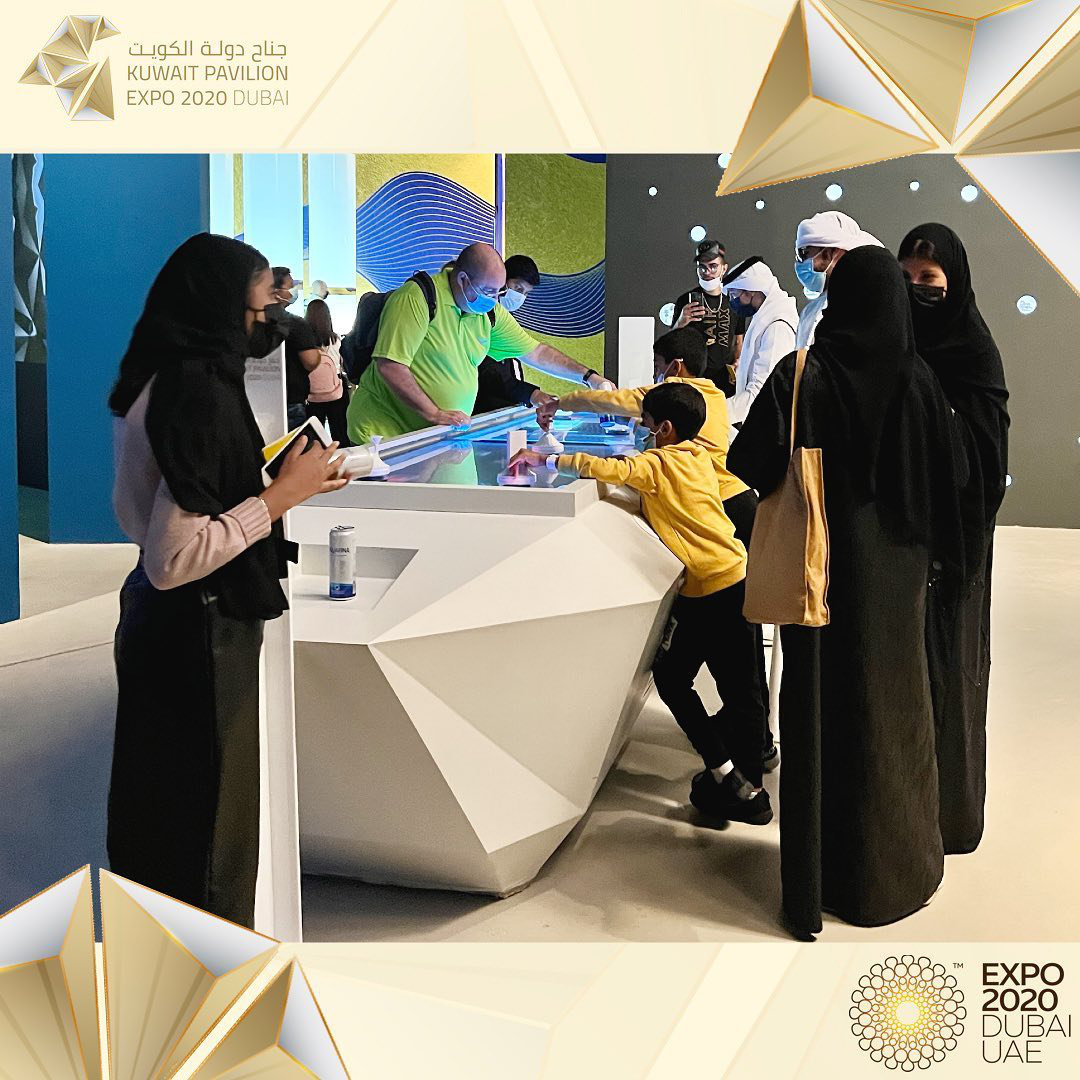
All generations are catered for at the pavilion, reflecting Kuwait’s youth and energy. (Supplied)
While this is, of course, a nod to the theme of the Expo of today, it also references Kuwait’s history as a connector of peoples and cultures. As an active and busy port, its capital has been a cosmopolitan, connecting city for centuries.
This continues to be the case. Kuwait’s Public Authority for Civil Information estimates the country’s population was about 4.4 million in 2019, with non-Kuwaitis accounting for nearly 70 percent of this total.
Kuwait’s dialect, food and music all contain evidence of rich influences from Iraq, Iran, Zanzibar, Oman and the other cultures the Kuwaiti people came into contact with during hundreds of years of trade, travel, immigration and acculturation.
The story Kuwait chooses to tell about itself through its pavilion at Expo 2020 is multifaceted, mirroring the diverse nature of its society, from its focus on sustainability to empowering its youth to lead the country and its people into the future.
Kuwait has a track record of cultural transformations. At Expo 2020, the nation shows it intends to push ahead with its Vision 2035 development program through the lens of sustainability.
A visit to the pavilion offers guests a more critical understanding of where Kuwait stands today — and, perhaps more importantly, where it is plans to be in the future.





